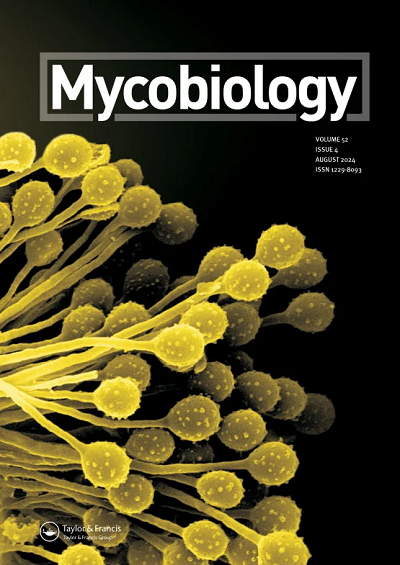Determining Potential Link between Environmental and Clinical Isolates of Cryptococcus neoformans/Cryptococcus gattii Species Complexes Using Phenotypic and Genotypic Characterisation
IF 1.6
4区 生物学
Q2 AGRONOMY
引用次数: 0
Abstract
Opportunistic infections due to Cryptococcus neoformans and C. gattii species complexes continue to rise unabated among HIV/AIDS patients, despite improved antifungal therapies. Here, we collected a total of 20 environmental and 25 presumptive clinical cryptococcal isolates from cerebrospinal fluid (CSF) samples of 175 patients enrolled in an ongoing clinical trial Ambition 1 Project (Botswana-Harvard Partnership). Identity confirmation of the isolates was done using MALDI-TOF MS and PCR. We describe the diversity of the isolates by PCR fingerprinting and sequencing (Oxford Nanopore Technology) of the intergenic spacer region. Mating types of the isolates were determined by amplification of the MAT locus. We report an unusual prevalence of 42.1% of C. neoformans x C. deneoformans hybrids Serotype AD (n = 16), followed by 39.5% of C. neoformans Serotype A (n = 15), 5.3% of C. deneoformans, Serotype D (n = 2), 7.9% of C. gattii (n = 3), and 5.3% of C. tetragattii (n = 2) in 38 representative isolates that have been characterized. Mating type-specific PCR performed on 38 representative environmental and clinical isolates revealed that 16 (42.1%) were MATa/MATα hybrids, 17 (44.7%) were MATα, and five (13.2%) possessed MATa mating type. We used conventional and NGS platforms to demonstrate a potential link between environmental and clinical isolates and lay a foundation to further describe mating patterns/history in Botswana.利用表型和基因型特征确定环境和临床分离新型隐球菌/加蒂隐球菌物种复合物之间的潜在联系
尽管抗真菌治疗有所改善,但在艾滋病毒/艾滋病患者中,由于新型隐球菌和C. gatii物种复合物引起的机会性感染继续有增无减。在这里,我们从175名患者的脑脊液(CSF)样本中收集了20种环境隐球菌和25种推定的临床隐球菌分离物,这些患者参加了正在进行的临床试验Ambition 1项目(博茨瓦纳-哈佛伙伴关系)。采用MALDI-TOF MS和PCR对分离菌株进行鉴定。我们通过PCR指纹和基因间隔区测序(牛津纳米孔技术)描述了分离物的多样性。通过MAT位点的扩增来确定分离物的交配类型。我们报告了42.1%的新生C. x变形C.杂交AD血清型(n = 16),其次是39.5%的新生C. A血清型(n = 15), 5.3%的变形C. D血清型(n = 2), 7.9%的加蒂C. (n = 3)和5.3%的四角C. (n = 2),在38个已被鉴定的代表性分离株中。对38株具有代表性的环境和临床分离株进行交配型特异性PCR,结果显示MATa/MATα杂交株16株(42.1%),MATα杂交株17株(44.7%),MATa交配型5株(13.2%)。我们使用传统和NGS平台来证明环境和临床分离株之间的潜在联系,并为进一步描述博茨瓦纳的交配模式/历史奠定基础。
本文章由计算机程序翻译,如有差异,请以英文原文为准。
求助全文
约1分钟内获得全文
求助全文
来源期刊

Mycobiology
AGRONOMYMYCOLOGY-MYCOLOGY
CiteScore
3.90
自引率
5.30%
发文量
41
审稿时长
22 weeks
期刊介绍:
Mycobiology is an international journal devoted to the publication of fundamental and applied investigations on all aspects of mycology and their traditional allies. It is published quarterly and is the official publication of the Korean Society of Mycology. Mycobiology publishes reports of basic research on fungi and fungus-like organisms, including yeasts, filamentous fungi, lichen fungi, oomycetes, moulds, and mushroom. Topics also include molecular and cellular biology, biochemistry, metabolism, developmental biology, environmental mycology, evolution, ecology, taxonomy and systematics, genetics/genomics, fungal pathogen and disease control, physiology, and industrial biotechnology using fungi.
 求助内容:
求助内容: 应助结果提醒方式:
应助结果提醒方式:


